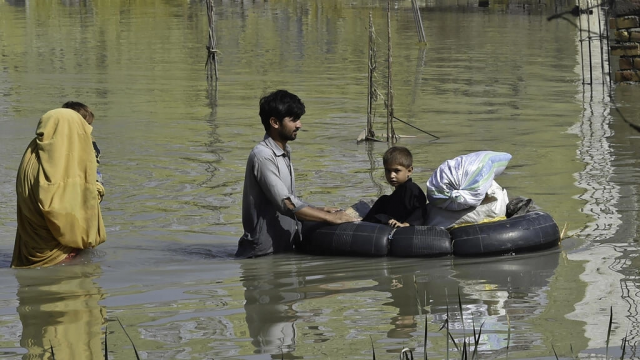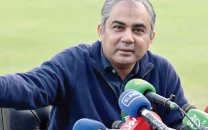ECC okays Rs103b for urgent relief
In addition to initial relief, the govt will separately compensate the people for the construction of their homes

The government on Tuesday allocated over Rs103 billion to provide urgent relief to 4.1 million flood-affected people and also approved a grant to give the State’s Guest status to a delegation of the Financial Action Task Force (FATF) that is currently visiting the country.
The Economic Coordination Committee (ECC) of the cabinet, which took the decisions, also doubled the country’s strategic wheat reserves quota, besides allowing the additional import of 800,000 metric tons of wheat by reversing a one-month old decision.
The ECC approved a summary and directed the BISP to disburse a total of Rs25,000 per household in the calamity-affected districts for poverty score up to 32, according to the Ministry of Finance.
The Finance Division will consult with the BISP to discuss the financial implications and required modalities. Furthermore, the Federal government will ask the provinces to provide their share in the relief for flood affectees, it added.
Read: UN makes pitch for Pakistan fundraising
The Ministry of Poverty alleviation and social safety submitted a summary for emergency cash assistance to affectees of the flash floods 2022.
The ministry has estimated the cost of Rs25,000 per family relief at Rs103.2 billion for a total beneficiaries of 4.12 million.
Prime Minister Shehbaz Sharif had directed the BISP to identify the bottom 60% population of affected notified areas of the country with the help of National Socio-Economic Registry Data.
In addition to initial relief, the government will separately compensate the people for the construction of their homes.
Unprecedented rains and flash floods across the country have resulted in loss of lives and properties. According to initial estimates about 33 million people have been affected by the floods. The relief money was approved the day the United Nations launched a global appeal for $160 million aid for Pakistan to help around 5.2 million people.
The ECC also approved Rs7 million budget for the National FATF Secretariat to incur expenses on giving the State of Pakistan’s Guest status to the FATF delegation.
The ECC was informed that the FATF team of 15 members was visiting Pakistan from 29th August to 2nd September in order to verify the stance of Pakistan as reported in cyclic reports.
The delegation has arrived to verify Pakistan’s claim that it has fully implemented all the 34 conditions that the global body fighting money laundering and terror financing had set under two different action plans for Pakistan’s exit from the grey list.
The visit has been described as “crucial” by Pakistan to make an exit from the grey list. Pakistan had been put on the list in February 2018 with effect from June of that year and since then is under global scrutiny.
This was a period that India exploited to change the demographic status of Jammu & Kashmir when Pakistan’s hands were tied and its economic conditions were weak to sustain any prolonged period of confrontation.
The Rs7 million expenses will be incurred on accommodation, food and travel of the FATF delegation during the five-day visit that is ending on Friday.
The ECC reversed its one month old decision to reduce the country’s strategic wheat reserves and also cut the import requirements. The Ministry of National Food, Security and Research presented a summary on re-fixing national wheat strategic reserves to the level of 2 million metric tons.
“In the wake of recent rainfall and flood damages ensuing financial issues of farmers for the next wheat sowing season, rising local wheat prices and hoarding and smuggling issues, the 1 million metric tons current quantity is insufficient”, according to the food ministry. .
In order to ensure wheat availability across the border and to stabilize local wheat prices, it was proposed that the quantum of wheat strategic reserves may be retained at the level of 2 million metric tons.
The ECC approved to reverse its decision and allowed for maintenance of strategic reserves of wheat at the level of 2 million metric tons, including a quantity of 80,000 tons on account of SAARC food bank.
Pakistan is paying Rs35 per kg subsidy on local wheat and Rs59 on imported wheat to provide wheat flour at relatively lower rates on the government-run utility stores corporation.
The ECC directed the Trading Corporation of Pakistan to arrange a further quantity of 800,000 metric tons either through government-to-government deal or open tender.
It was added that import of 800,000 metric tons wheat is allowed to the private sector with provision that subsidy shall not be provided for such imports of wheat, according to the decision.
The Ministry of Communication submitted a summary for extension of time to complete the business plan for the National Highway Authority from June 30, 2022 to Sep. 30, 2022. It was shared that NHA has already shared information with ADB consultants for preparation of the business plan of NHA.
However additional time is required to complete the same.
This summary was approved by ECC with the provision that no further extension would be given. In case a further extension is sought, the Finance Division will start deducting interest on Cash Development Loans (CDL).
The ECC also approved signing of the remaining six agreements with Italy, Japan and Spain for deferment of $189.5 million loan repayments under the G-20 debt relief initiative. With the fresh signing, the total relief that Pakistan obtained stood at $3.7 billion since the large 20 economies of the world provided the window.



















COMMENTS
Comments are moderated and generally will be posted if they are on-topic and not abusive.
For more information, please see our Comments FAQ